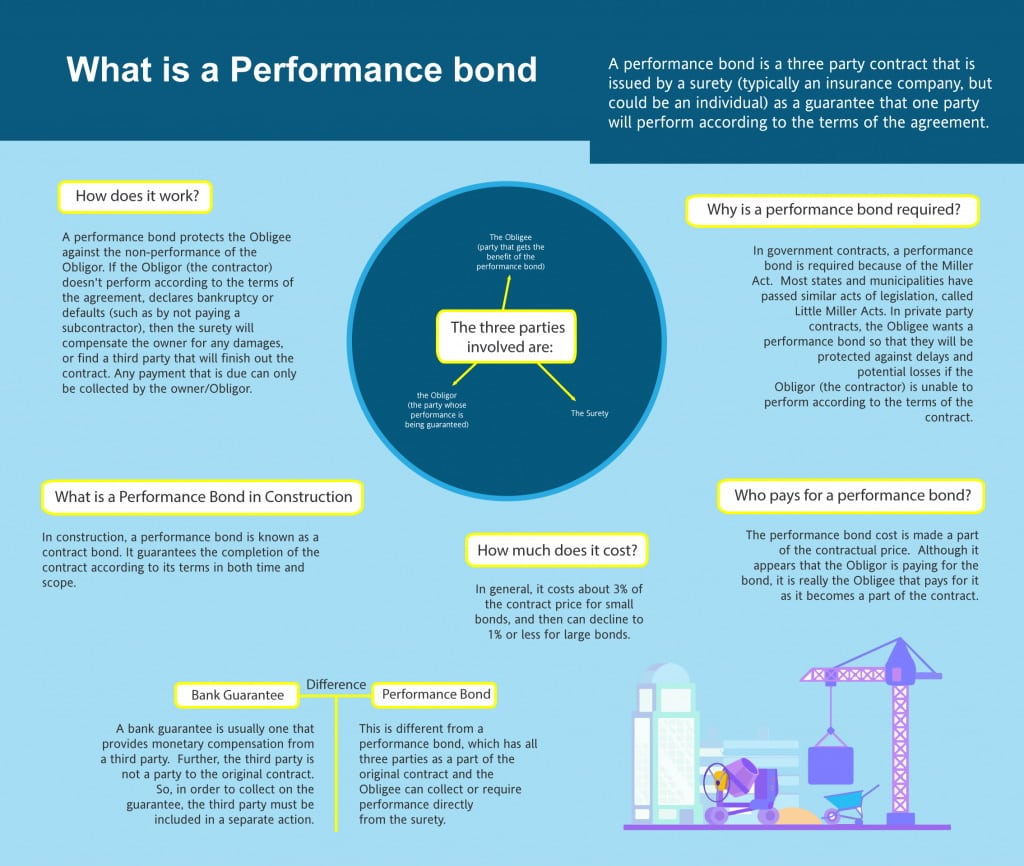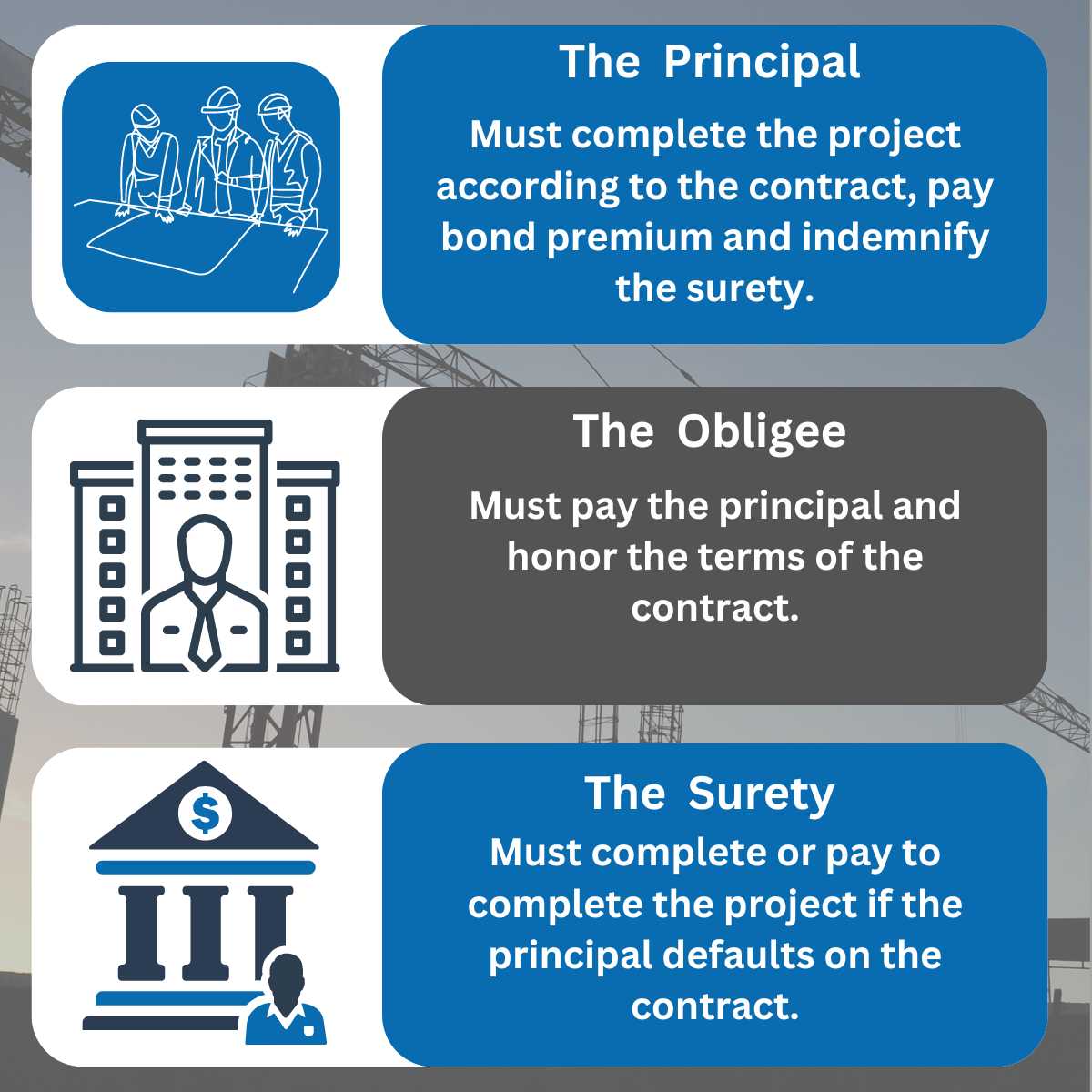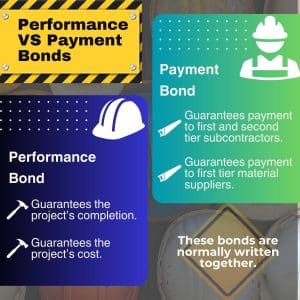Performance Bond
What are Performance Bonds?
Simply put, it's a bond issued by a surety company (think large insurance company) that guarantees the satisfactory completion of a project or a job (i.e., a construction project).
A Performance Bond ensures that a contractor will complete their work according to the terms of the contract. The terms and conditions provide for when the project will be built (and to what standards), and at what price. The bond further protects the owner from a default on the part of the contractor due to a delay in construction or construction work that is substandard.
What is a Performance Bond in Construction?
How Do Performance Bonds Work?
Principal
Obligee
Surety
What Do Performance Bonds Cost?
Performance Bonds Cost between 0.5% – 3% of the contract amount. In our experience, most contractors will pay between 1% – 2% of the contract amount. The price of a performance bond depends on several factors including the credit and financial strength of the customer and the type of work being bonded. Other factors such as the length of the contract and warranty period may also add the cost.


Who Pays for a Performance Bond?
How Do You Get a Performance Bond?
We Run Credit
We run a simple personal credit check.
Submit An Application
Complete an online application or print and email one to us.
The Contract
Send us the contract or purchase order needing a performance bond.
For larger performance bonds, an application, personal financial statement and often company financial statements may be required. Swiftbonds represents many of the nation's leading bond companies to get contractors the approval they need at the best terms possible. We have helped thousands of contractors nationwide get performance bonds. Contact us to learn why we are one of the nation's leading performance bond companies!
Why Do I Need a Performance Bond?
What is Performance Bond and Payment Bond?
Performance Bonds are often written together with Payment Bonds. However, these are two different types of surety bonds and guarantees. While a performance bond guarantees the completion of a contract for a set price, a payment bond guarantees that certain subcontractors and material suppliers will be paid for their work. Payment bonds are necessary on public projects because subcontractors and suppliers do not have mechanic's lien rights. However, payment bonds are often used on private projects as well to ensure that they remain lien free.
When a performance bond is written together with a payment bond, there is only one cost for both bonds. In our experience, it is very common for both bonds to be required together. The obligee really gets 200% coverage for their project for the price of 1 bond because the performance bond normally covers 100% of the contract amount, while the payment bond also covers 100% of the contract amount.
Are Performance Bonds Insurance?


It is easy to mistake performance bonds for insurance. In fact, many insurance companies write performance bonds. However, performance bonds are not insurance. They are a type of surety bond called a “Contract Surety Bond.” Performance bonds are actually a three-party agreement between. The principal on the bond purchases the performance bond for the benefit of a third-party, which is the obligee. Insurance is a two-party agreement. The insured purchases insurance for the benefit of themselves. See here for our California Performance Bonds.
Differences Between Performance Bonds and Bank Letters of Credit
Cost - 0.5% - 3%.
Generally, not collateralized.
Does not restrict other borrowing.
Requires defense of claims.
Cost - Tied to interest rates. 1% - 5%.
Cash or hard collateral often required.
Borrowing is usually reduced by LOC amount.
Taken with no defense if a claim occurs.
Another advantage of performance bonds is cost. Performance bonds are not directly influenced by interest rates. Their cost tends to be more stable. Letters of credit are often tied to a benchmark rate and can fluctuate with the overall economy.
If a claim does occur, performance bonds require that a claims professional investigate the claim before paying. Bank letters of credit have no such protection. The line of credit is generally paid on demand and it would be up to the contractor to try and recover through legal means.
Performance Bond Frequently Asked Questions
What is a Performance Bond in Construction?
When Are Performance Bond Released?
Are Performance Bonds Refundable?
What is a 100 Performance and Payment Bond?
What Happens if a Claim is Filed on a Performance Bond?
What Happens if a Performance Bond in Called?
How Long Does it Take to Get a Performance Bond?
How Do You Collect on a Performance Bond?
What is a Bonding Rate?
What Are the Three Types of Construction Bonds?
What Happens if Performance Bond Expires?
What is a Warranty Bond?
Other Featured Surety and Construction Articles
Understanding Exclusions and Limitations in Surety Bonds
Are Exclusions and Limitations More Common in Specific Types of Surety Bonds Exclusions and limitations in surety bonds vary depending on the type of bond and the risk associated with it. Bonds such as construction bonds often have specific exclusions related to...
The Role of Surety Bonds in Construction Projects
How Does the Release of a Surety Bond Impact the Principal’s Financial Obligations to Subcontractors or Suppliers? When a surety bond is released, it typically signifies the completion of the project or the fulfillment of the principal's obligations. Subcontractors...
Understanding Surety Bonds and Their Scope
Are There Any Restrictions on the Types of Projects or Contracts That Can Be Covered by Surety Bonds? Surety bonds typically cover a wide range of projects and contracts across various industries. However, there are some restrictions based on the bond type and...




